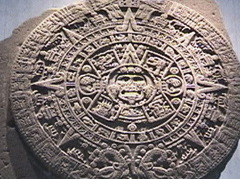The Pulse Archives
The Mayan Calendar provides a history lesson
By Jhonattan Flores | Pulse Staff Reporter
According to the Mayan Calendar, the world is going to end on Dec. 21, 2012.
Keisha Johnston, a sophomore Nursing major, said, “It’s amazing how the Mayans were able to calculate future dates. I don’t think the world will end, but if something were to be predicted, it would change the history of mankind.”
The Maya didn’t create the calendar. It was used by other cultures in pre-Columbian Central America, but it included the Maya from around 2000 BC to the 16th century, according to the website Indians.org.
If scientists are telling us this calendar is not believable or accurate, why do some, not all, people believe the world will end? In the past year and half, other predications about the world ending have occurred.
One predication was made by American Christian radio host Harold Camping who said, “The rapture and judgment day would be on May 21, 2011, and the world would end five months later on October 21, 2011.”
In March 2012, Camping admitted that he was wrong and his attempt to predict a date was “sinful” and his critics had been right in showing to the scriptural text “of that day and hour knoweth no man.”
In March 2012, Camping said he is now looking to the Bible, “Even more fervently, not to find dates, but to be more faithful in our understanding.”
Dr. Glen S. Tanck, a professor of Geology, said, “Nothing unusual will happen on December 21. It will just be a normal day.”
Timeanddate.com agrees: “There is simply no scientific evidence to support any claims of an apocalypse on Earth in December 2012...The end of the Mayan calendar does not imply the end of the world, only the end of the Mayan long-count period. The ‘long count’ is a part of the Maya calendar shaped like a wheel. When we reach the end of the wheel, it will simply turn to the beginning again, just like our modern Gregorian calendar starts again every January 1.”
Ray Bosquez, a freshman History major, said, “The Mayan shouldn’t define if the world is going to end. It’s the most accurate calendar, but I just don’t understand or know how to read it."
According to NASA.gov, scientists talked about the impossibility of the polar shift theory, a reversal in the rotation of earth. We have very slow movements of continents, but its irrelevant to claims of reversal of the rotational poles.
“However, many of the disaster websites pull a bait-and-switch to fool people. They claim a relationship between the rotation and the magnetic polarity of Earth, which does change irregularly, with a magnetic reversal taking place every 400,000 years on average,” according to the NASA.gov website.
“As far as we know, such a magnetic reversal doesn’t cause any harm to life on Earth. Scientists believe a magnetic reversal is very unlikely to happen in the next millennia,” according to the NASA.gov website.
Professor Marina Orneles, a Humanities professor, said, “Nothing will happen on December 21, 2012. It’s been repeated so many times people will believe what they have heard so many times.”
The Mayan Calendar is something interesting to read, but it shouldn’t have an ability to scare people into believing it. Scientists have done research about this topic and say that nothing will happen at all.
October 2012
- Successful alumni encourage current students to persevere
- New Palo Alto president calls for an all-college conversation
- Crosswalk safety at Palo Alto College is a concern
- Middle men and women of Palo Alto have your back
- Elections 2012: The aftermath
- Logistics program at Palo Alto College providing in-demand jobs
- Students may attend area museums for free
- Clubs and Organizations give students a chance to share interests
- Winter sports and activities: Breaking the ice
- Sleep Deprivation: A student's worst nightmare
- Gas prices affecting San Antonio's citizens
- Christmas coming early for 250 college graduates
- Diabetes a growing issue in the San Antonio region
- The Mayan Calendar provides a history lesson
- Fall 2012 Reporters
